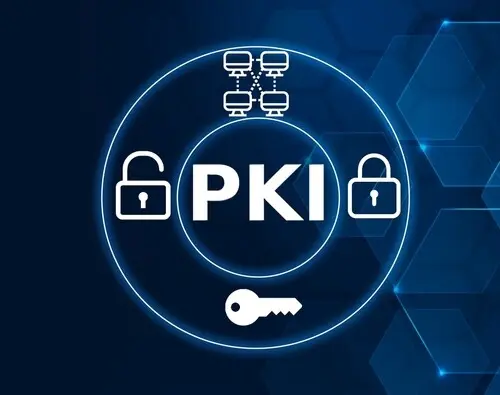With more businesses moving operations online and sensitive data being stored and transmitted digitally, ensuring data security has become a top priority. Public Key Infrastructure PKI is a widely used digital security framework that uses public and private key encryption and digital certificates.
PKI provides numerous benefits to organizations looking to safeguard their systems and information. This article will explore the top 5 benefits of implementing a PKI solution.
1. Strong Encryption
One of the best advantages of PKI is the powerful encryption that is applied. PKI uses a type of encryption known as asymmetric cryptography, which involves a public key and a private key. A public key is used to encrypt data, and the private key decrypts the data. In this sense, data could be encrypted by PKI in a safe way. While symmetric encryption uses the same key to encrypt and decrypt, it could make it risky if the key is exposed.
So, if the private key should be intercepted or stolen, it would not be useful to decrypt data encrypted with it in the past. PKI is based on really big keys, say 2048-bit or more, to yield just unbreakable mathematical encryption. This makes it impossible not only to decipher the communication intercepted but also to keep all the data on the systems and servers safe from cyber attackers. Most of the regulatory bodies agree that 2048-bit and more encryption is strong enough to guarantee the confidentiality of sensitive information.
Encryption at rest is also offered by PKI; hence, if sensitive files are within an organization’s network or an organization’s cloud, they can be encrypted if they are at rest. Public key cryptography offered through PKI can encrypt sensitive files stored digitally within an organization’s network or in the cloud.
2. Secure Authentication
Another core benefit delivered by PKI is secure authentication. When properly implemented with digital certificates, PKI enables strong two-factor or multi-factor authentication for logins, access, authorization, and transactions. Digital certificates securely bind public keys to user identities, allowing identity verification during interactions. Through certificate-based authentication, PKI confirms who users are and that they possess valid private keys.
Compared to basic username and password authentication, which is prone to compromise, PKI authentication is significantly more robust and resilient against cyber-attacks like phishing. It helps block unauthorized access even if weak or stolen credentials are used. Additionally, PKI can support single sign-on (SSO) authentication across multiple applications and services within an enterprise. This streamlines the user experience while upholding a high level of security.
3. Data Integrity
Another important benefit of PKI is that it assures data integrity. PKI systems combine digital signatures to verify whether data or documents are altered or corrupted from when they are sent up to when they are stored. Digital signatures are simply authentication codes derived from a private key of the sender, which can be verified with a public key. If the signed data were to be altered, the signature would not verify the data.
This way, PKI can assure that data received electronically is the same as when it was originally digitally signed. This holds huge meaning for businesses in healthcare, finance, and government, among others. PKI ensures that things like medical records, financial transactions, or legal contracts have not been tampered with.
4. Regulatory Compliance
Given the sensitivity of the information companies handle, cybersecurity and data protection regulations have become increasingly stringent. Implementing PKI offers clear compliance benefits as it aligns with several mandates for safeguarding private information and digital assets. It also supports compliance activities like verification of electronic signatures, non-repudiation of signed documents, and delivery receipts to meet e-commerce and e-filing regulations.
Additionally, implementing a PKI solution simplifies auditing to demonstrate compliance for regulators. Key elements like encryption policies, key lifecycles, certificate management practices, and more are all centrally administered through PKI. Effective PKI solutions also offer reporting features to ease compliance monitoring and documentation.
This is especially helpful for compliance programs, especially for large enterprises that must prove diligence across distributed global operations. Properly implemented PKI thus makes it easier for businesses to comply with a wide range of cybersecurity and electronic transaction regulations.
5. Scalability and Flexibility
As organizations grow and IT infrastructures become more complex, cybersecurity measures must scale accordingly while allowing flexibility. A major advantage of PKI is that it can scale to support the dynamic security requirements of large enterprises with thousands of users, devices, applications, and services spread over varied locations. PKI architecture is highly scalable and can issue and manage certificates efficiently across expanding networks.
It can also accommodate multiple domains, sub-domains, and subordinate CAs to structure certificate hierarchies for smooth deployment. By distributing certificate services through subordinate CAs, PKI keeps certificate management tasks localized while adhering to centralized policies. PKI infrastructures are also highly flexible and can adapt security controls based on user roles, departments, device types, and more through group-based policies. Embedded policy engines within PKI strengthen granular access management.
Final Thoughts
In today’s digital environment with rising cyber threats and compliance requirements, effective data security is critical for businesses but challenging to achieve. PKI emerges as a robust solution that delivers multiple advantages beyond the scope of traditional cybersecurity tools. The five key benefits of strong encryption, secure authentication, data integrity assurance, regulatory compliance, and scalable flexibility make PKI highly valuable for organizations of any size.

